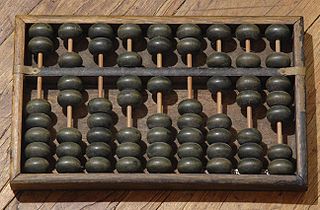15110 Spring 2013 [Kaynar/Gunawardena]
Written Homework 1 - due Friday, January 25 in class
Reading Assignment
Read sections 1.1-1.2 of chapter 1 of the textbook Explorations in Computing
and read chapter 1 of the book Blown To Bits.
Instructions
-
Type or neatly write the answers to the following problems.
-
Please STAPLE your homework before you hand it in.
-
On the first page of your homework, include your name,
andrew ID, lab section (A-N), and the assignment number.
-
You must hand in your homework at the start of class on the due date
shown above.
Exercises (10 points total)
-
(1 pt) Below are pictures of a Chinese abacus (suanpan) and a Japanese
abacus (soroban). Why does the Chinese abacus have two heaven beads
and 5 earth beads in each column, while the Japanese abacus has one
heaven bead and 4 earth beads? Hint: Google is your friend.

Chinese abacus (suanpan) |

Japanese abacus (soroban) |
-
(1 pt) Babbage's Difference Engine utilized the method of finite
differences to compute the values of a polynomial function. Suppose
Babbage computes the values of the function and all of its difference
functions for x=0 and puts these into the machine, as shown
below. What does the machine compute for f(1), f(2), f(3) and f(4)
when the handle is cranked?
f(0) = 6
Δf(0) = 3
Δ2f(0) = 4
Δ3f(0) = 7
-
(1 pt)
Charles Babbage wants to compute all of the function values for
the polynomial f(x) = 3x2 + 6x + 7 for x = 1 to 1000.
Using the method of finite differences, what initial values does
he set his machine to if he wants it to start at x = 0? (Hint: You'll
need to compute the difference (delta) functions first.)
- (1 pts) How did the invention of integrated circuits and microprocessors revolutionize the field of computing? Hint: Think of the size of older computers.
-
(2 pts)
-
Moore's Law states that the processing power of
a computer doubles approximately every 2 years.
Based on this observation, how many years will
it take to have a computer that is approximately
a million times more powerful than today's computer?
-
An electronic device has 256GB of memory.
It is connected to a communication port that receives
data at a rate of 16Mbps. How long will it take to
fill up the memory of this device if it starts off
empty? Note the lower case b in 16Mbps. It means 16 mega-bits (not bytes) per second.
- (4 pts) Based on your reading of Chapter 1 of Blown To Bits,
answer the following questions.
- Years ago, people copied songs on to cassette tapes and shared them with their friends, yet the recording industry did not pursue these people for copyright infringement. Today, however, sending a friend a copyrighted mp3 file can get you in trouble. Why is the response different now?
- Once digital data about you is stored by a third party, can you be sure that it could be completely expunged upon your request? Why or why not?
- Explain what it means for something to grow exponentially and why it is important as a measure of rate of change.
Give an example from the book about a type of exponential growth that had great impact on computing. (HINT: Think what happened to the speed of processors since the 60s.)
- To what extent can we assume that the world's people are interconnected without any borders? Do national and state borders still matter? Give examples from the book. You can use examples from other sources provided that you give a reference to that source.
-
Why has outsourcing customer service calls become a common business practice?

